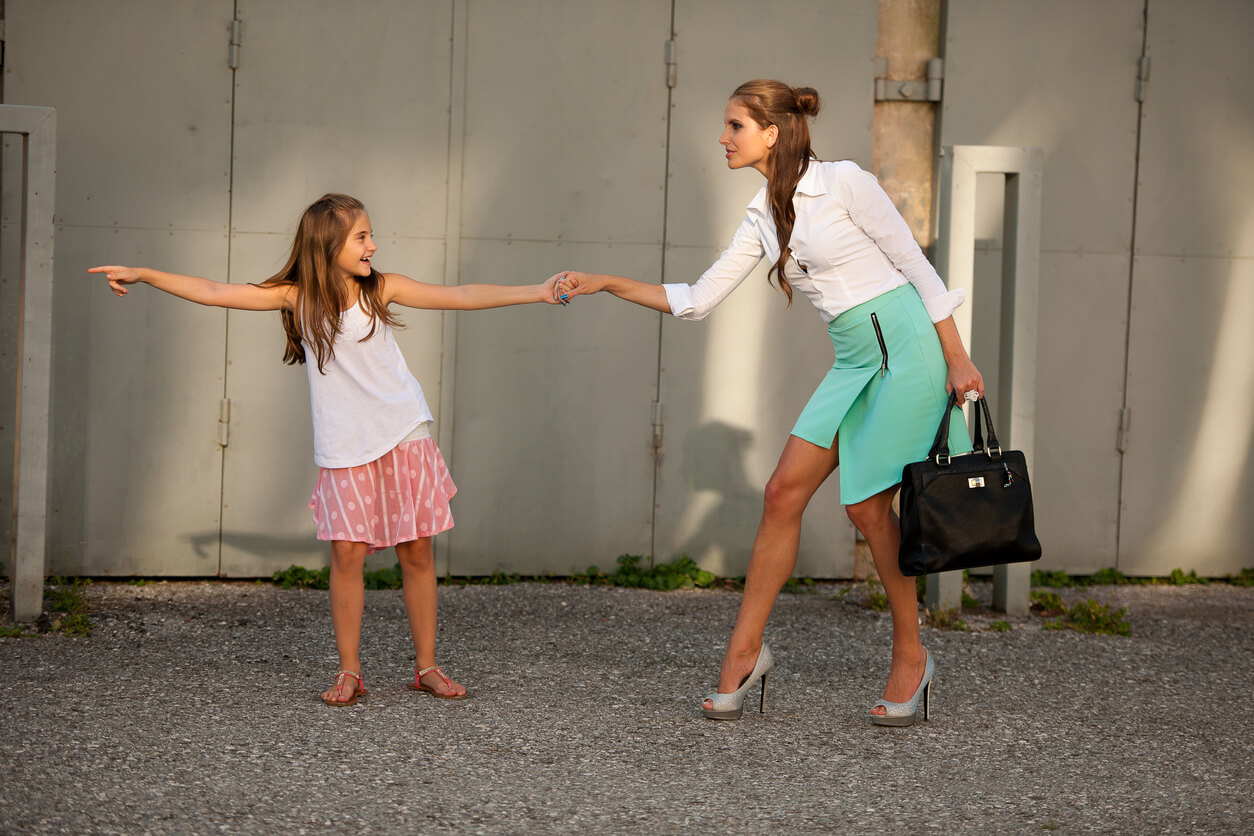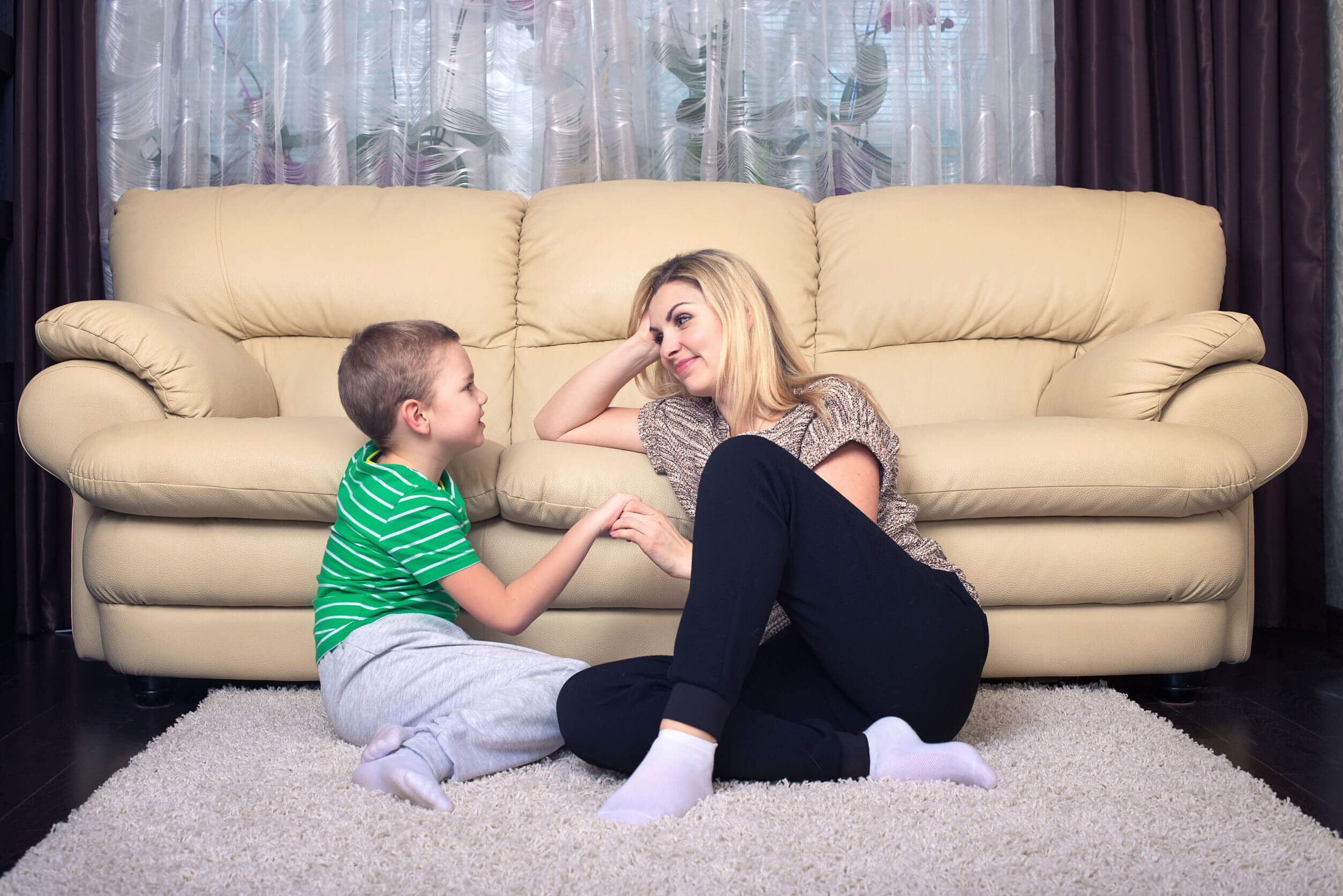Always Angry With Your Children? What You Can Do

At the end of the day, your house looks like a battleground: Anger and yelling on your part, which triggers crying, tantrums, and more anger. As a result, you feel you spend more time being angry with your children than enjoying spending time with them.
But why is this becoming more and more frequent? We’ll help you to understand the reasons for your discomfort and find out how to solve it. Keep reading!
Feeling constantly angry with your children
Being angry with your children isn’t usually the result of a single cause and generally involves an accumulation of stressful situations. Sometimes they have to do with your kids, but other times, they come from a much more remote root.
Here are some of the possible triggers of your anger.
Stress and haste
The daily pace and multiple responsibilities and pressures of adult life cause discomfort, anxiety, and nervousness. Therefore, a seemingly insignificant event, such as being late getting changed for school, becomes a trigger for anger.

Expectations and fantasies
Sometimes, anger with children has to do with expectations and idealizations prior to motherhood. We imagine that our children will be a certain way, just as we would like them to be. Perhaps even as we would have liked our childhood to be, as parenthood always takes us back to our past.
Difficulty in managing one’s emotions
The lack of self-control and the impossibility of burning off anger in a healthy way reveal a difficulty with one’s own emotional world. We all have a right to feel angry, but lashing out is never a good idea.
Lack of boundaries
Sometimes, anger is the consequence of a previous situation in which rules and boundaries haven’t been made clear. Children behave in a certain way because there was no previous agreement on what to do and what not to do, what’s allowed, and what isn’t.
What can I do when I get angry with my children?
The recommendations regarding anger with children shouldn’t be isolated from the causes that motivate it because if we take into account the context, we’ll be better oriented to solve it.
However, when you get angry yo,u can implement some of the following strategies:
- Breathe and learn relaxation techniques. Oxygenating our brain allows us to regain calm and make good decisions, as well as to choose better ways of reacting to displeasure. You can also practice muscle tension and relaxation exercises for the same purpose.
- Managing emotions. It’s okay to give way to anger from time to time, because it’s a valid emotion and because it has something to tell us. But it’s important to learn to express it and to channel it in a healthy way. We must identify what helps each of us to react better: To interrupt the situation until we calm down, to channel it through physical activity, or to take a breath of air.
- Once we recognize the emotions, we must begin to explore the origin of the anger. It’s worth asking ourselves, is it really something my child did that makes me angry, or does it have nothing to do with them? Trying to explore emotions helps us to understand and know ourselves better. And from there, to better choose what to do.
- Try to exercise empathy. Many times, we forget that our children are small and that they don’t always have the capacity to solve problems or to behave in a certain way. Instead of getting angry with them, we can stop and think about what motivates their behavior and try to adapt our response to that need.
Additional recommendations for dealing with anger with your children
- Ask ourselves what things are worth getting angry about and what things aren’t. Sometimes we learn that anger is the only possible response. But not everything is equally important and perhaps other responses may be more appropriate in some cases.
- Respect individuality. One of the ways to avoid anger with children is to try to understand that each child is as he or she is, with their own personality, desires, dreams, and needs. They’re not and will not be our image and likeness and there’s nothing wrong with that, quite the contrary. Let’s facilitate an authentic life that allows them to feel fulfilled to be who they want to be and, above all, supported.
- Finally, it’s crucial to learn to apologize if we’ve gone too far in our behavior. It’s good for children to see that their parents are capable of recognizing mistakes when they make them. It makes them more genuine and human.
The importance of not getting angry with your children

Both mothers and fathers are flesh and blood people, trying to do the best for their children and also dealing with numerous other issues. Understanding this is a good starting point to take a load off your shoulders and allow yourself to have bad days.
However, it’s equally important to learn how to manage emotions and avoid venting anger in a way that’s harmful to those around you, especially your children.
Anger is constructive when you understand what it’s trying to show, but it’s extremely destructive when it becomes excessive or leads to saying things you don’t mean or feel.
Contrary to what many believe, getting angry and yelling at your children does not facilitate learning, but quite the opposite: It teaches them negative and ineffective models for solving problems. As if getting angry or yelling were the only way to ask for things. Over time, they become accustomed to anger, and yelling seems like background noise. The hostile environment “anesthetizes” them and causes parents to start yelling even louder.
Finally, it’s important to keep in mind that parenting style is decisive for the development and well-being of children. In this sense, sustained anger acts to the detriment of the quality of life of all the people who make up that family.
Do you have your own place?
Parents accompany the education of their children, which implies an enormous challenge and a great demand. But in order to regulate others, it’s important to know how to regulate oneself. For this reason, you need to allow time for rest and personal leisure, to recover individual spaces, and to reconnect with what defines who you are.
It’s also essential to learn to ask for help and to identify those things that push everything to the limit, in order to address them and contain them before they trigger discomfort.
At the end of the day, your house looks like a battleground: Anger and yelling on your part, which triggers crying, tantrums, and more anger. As a result, you feel you spend more time being angry with your children than enjoying spending time with them.
But why is this becoming more and more frequent? We’ll help you to understand the reasons for your discomfort and find out how to solve it. Keep reading!
Feeling constantly angry with your children
Being angry with your children isn’t usually the result of a single cause and generally involves an accumulation of stressful situations. Sometimes they have to do with your kids, but other times, they come from a much more remote root.
Here are some of the possible triggers of your anger.
Stress and haste
The daily pace and multiple responsibilities and pressures of adult life cause discomfort, anxiety, and nervousness. Therefore, a seemingly insignificant event, such as being late getting changed for school, becomes a trigger for anger.

Expectations and fantasies
Sometimes, anger with children has to do with expectations and idealizations prior to motherhood. We imagine that our children will be a certain way, just as we would like them to be. Perhaps even as we would have liked our childhood to be, as parenthood always takes us back to our past.
Difficulty in managing one’s emotions
The lack of self-control and the impossibility of burning off anger in a healthy way reveal a difficulty with one’s own emotional world. We all have a right to feel angry, but lashing out is never a good idea.
Lack of boundaries
Sometimes, anger is the consequence of a previous situation in which rules and boundaries haven’t been made clear. Children behave in a certain way because there was no previous agreement on what to do and what not to do, what’s allowed, and what isn’t.
What can I do when I get angry with my children?
The recommendations regarding anger with children shouldn’t be isolated from the causes that motivate it because if we take into account the context, we’ll be better oriented to solve it.
However, when you get angry yo,u can implement some of the following strategies:
- Breathe and learn relaxation techniques. Oxygenating our brain allows us to regain calm and make good decisions, as well as to choose better ways of reacting to displeasure. You can also practice muscle tension and relaxation exercises for the same purpose.
- Managing emotions. It’s okay to give way to anger from time to time, because it’s a valid emotion and because it has something to tell us. But it’s important to learn to express it and to channel it in a healthy way. We must identify what helps each of us to react better: To interrupt the situation until we calm down, to channel it through physical activity, or to take a breath of air.
- Once we recognize the emotions, we must begin to explore the origin of the anger. It’s worth asking ourselves, is it really something my child did that makes me angry, or does it have nothing to do with them? Trying to explore emotions helps us to understand and know ourselves better. And from there, to better choose what to do.
- Try to exercise empathy. Many times, we forget that our children are small and that they don’t always have the capacity to solve problems or to behave in a certain way. Instead of getting angry with them, we can stop and think about what motivates their behavior and try to adapt our response to that need.
Additional recommendations for dealing with anger with your children
- Ask ourselves what things are worth getting angry about and what things aren’t. Sometimes we learn that anger is the only possible response. But not everything is equally important and perhaps other responses may be more appropriate in some cases.
- Respect individuality. One of the ways to avoid anger with children is to try to understand that each child is as he or she is, with their own personality, desires, dreams, and needs. They’re not and will not be our image and likeness and there’s nothing wrong with that, quite the contrary. Let’s facilitate an authentic life that allows them to feel fulfilled to be who they want to be and, above all, supported.
- Finally, it’s crucial to learn to apologize if we’ve gone too far in our behavior. It’s good for children to see that their parents are capable of recognizing mistakes when they make them. It makes them more genuine and human.
The importance of not getting angry with your children

Both mothers and fathers are flesh and blood people, trying to do the best for their children and also dealing with numerous other issues. Understanding this is a good starting point to take a load off your shoulders and allow yourself to have bad days.
However, it’s equally important to learn how to manage emotions and avoid venting anger in a way that’s harmful to those around you, especially your children.
Anger is constructive when you understand what it’s trying to show, but it’s extremely destructive when it becomes excessive or leads to saying things you don’t mean or feel.
Contrary to what many believe, getting angry and yelling at your children does not facilitate learning, but quite the opposite: It teaches them negative and ineffective models for solving problems. As if getting angry or yelling were the only way to ask for things. Over time, they become accustomed to anger, and yelling seems like background noise. The hostile environment “anesthetizes” them and causes parents to start yelling even louder.
Finally, it’s important to keep in mind that parenting style is decisive for the development and well-being of children. In this sense, sustained anger acts to the detriment of the quality of life of all the people who make up that family.
Do you have your own place?
Parents accompany the education of their children, which implies an enormous challenge and a great demand. But in order to regulate others, it’s important to know how to regulate oneself. For this reason, you need to allow time for rest and personal leisure, to recover individual spaces, and to reconnect with what defines who you are.
It’s also essential to learn to ask for help and to identify those things that push everything to the limit, in order to address them and contain them before they trigger discomfort.
All cited sources were thoroughly reviewed by our team to ensure their quality, reliability, currency, and validity. The bibliography of this article was considered reliable and of academic or scientific accuracy.
- Payne Brison, T. y Siegel, D. J. (2015). Disciplina sin lágrimas. España: S. A. Ediciones B.
- Orientación para familias sobre Autorregulación emocional y alternativas para eliminar la violencia en la crianza. (2020) – OPS y UNICEF.
- Ramírez-Lucas, Ana, Ferrando, Mercedes, & Sainz, Ana. (2015). ¿Influyen los Estilos Parentales y la Inteligencia Emocional de los Padres en el Desarrollo Emocional de sus Hijos Escolarizados en 2º Ciclo de Educación Infantil?. Acción Psicológica, 12(1), 65-78. Disponible en: https://dx.doi.org/10.5944/ap.12.1.14314
This text is provided for informational purposes only and does not replace consultation with a professional. If in doubt, consult your specialist.








